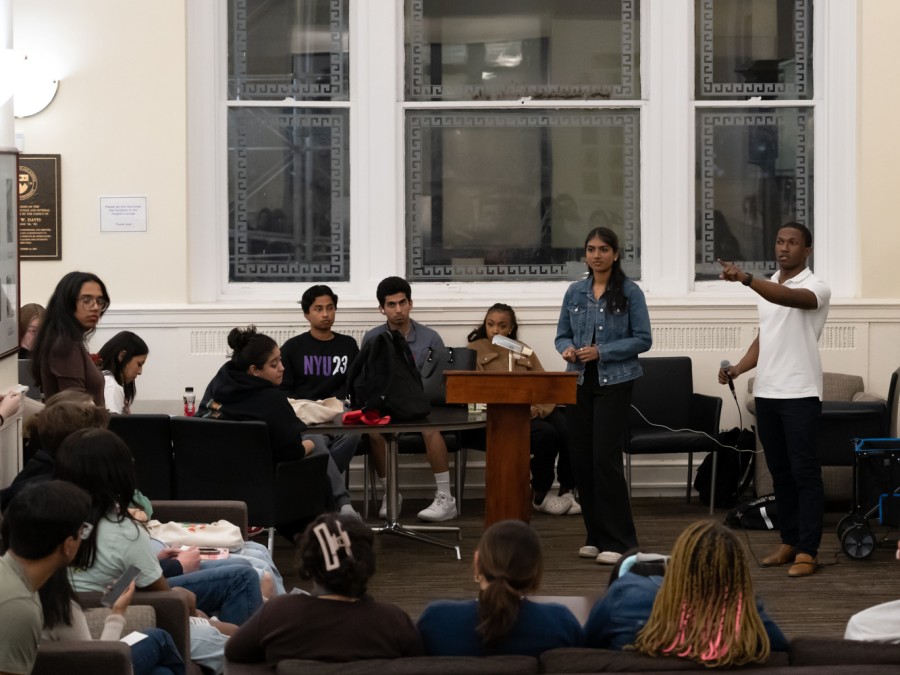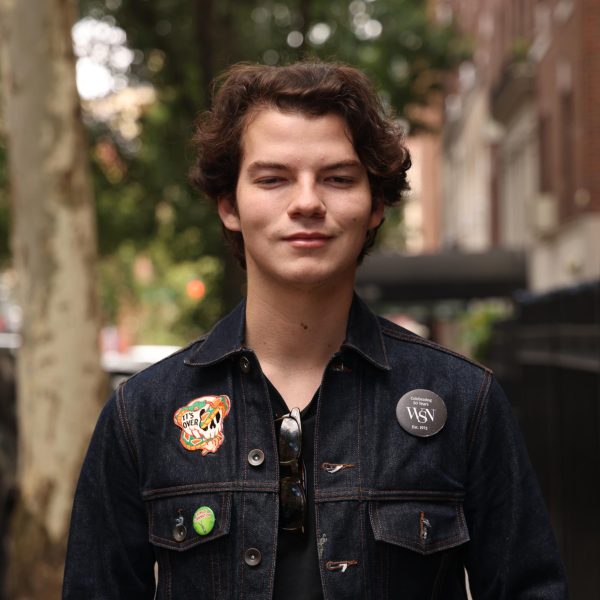Opinion: The CAS Student Council’s decision to oust a candidate was unfair
The student council president’s unprecedented overreach of executive power sets a dangerous example for future presidents.
File photo: Prash Allam (left), vice president of the CAS Student Council, and Ron Hall (right), senator of the CAS Student Council, taking questions from members of the student government. Adiba Chowdhury, the ousted CAS student council presidential candidate, is standing on the far left. (Qianshan Weng for WSN)
April 28, 2023
This month has been tumultuous for the College of Arts & Science Student Council. Two weeks ago, amid elections for the council’s next president, one of the candidates, Adiba Chowdhury, was taken out of the running after violating two election rules in the council’s election code. Although the council’s election committee decided to drop Chowdhury’s second charge, Veronica Spinelli, the president of the council, overturned its decision by using an “executive order,” forcing Chowdhury to drop her campaign.
Spinelli’s executive power allowed her to single-handedly decide the outcome of the election. Her actions constituted a clear overreach of power.
The specific charges against Chowdhury were that she had campaigned in person and posted about her campaign on Instagram outside of the allotted campaigning timeline. Because the election code states that if a candidate is found guilty of two minor violations they will be disqualified from the election, Chowdhury was ousted from the race.
On April 8, the election committee dismissed the social media charge, and cleared Chowdhury to continue campaigning, but the committee’s decision was abruptly overturned by Spinelli’s executive order. Spinelli cited concerns over bias within the election committee as her reason for issuing it. The order effectively handed the victory to the only other candidate in the race, Sam McCormack, despite Chowdhury having won many more votes, according to a WSN report.
“An executive order past the election close — which the commission had never actually agreed to — is nowhere near in line with the spirit of what we’re meant to do on Student Council,” Chowdhury told me about the decision.
The section of the CAS Student Council’s constitution with guidelines for using executive power holds that executive orders should only be used to create “new procedures” that aren’t already addressed elsewhere in the document. Miscellaneous complaints of bias do not qualify as a valid need for any sort of “new procedure,” however, because there are places in the constitution that outline fair elections. This criteria, though vague, offers an avenue for addressing unprecedented issues — not a pathway for the president to override guidelines for existing ones.
Another section states that the president should use executive decisions to ensure the “orderly operation of the General Assembly.” This sentence could be used as justification for Spinelli’s actions, but still falls short because there is no evidence that the election was hindering the operation of the general assembly.
In a democratic system — and the CAS student government, voted on by the entire student body, is one — it is crucial for constituents to trust that elected officials are acting in the best interest of everyone. The backbone of this trust is that constituents have a choice in their elected officials, and that politicians themselves can’t control that process.
Despite the lack of oversight in how the council uses executive power, there is still a possibility that Spinelli’s overstep could be overturned. The CAS Student Council is holding a schoolwide vote to decide whether to change the election rules and create a more lenient process for election rule breakers. For this particular vote, we have two choices. One, whether to approve a more lenient system for violations in the election process — the current rules against campaigning in person were created for the COVID-19 pandemic — and two, whether to apply them to this current election. These changes would make it so that the election committee would look at violations on a case-by-case basis and choose the proper punishment accordingly.
It is crucial to make your voice heard and cast your vote to bring about changes in the election rules. This will enable us to have confidence and trust in the fairness of the election process for the next leader of the CAS Student Council, which is not a small job. The CAS president may go on to be the student government chair, essentially acting as the voice of the entire student body when it comes to school affairs. It’s important that they’re elected by all of us, not just one person.
“I hope that no other candidate has to experience what I have in the process — that’s why I’m so opposed to the precedents set by this election period, and why I agree with the changes proposed,” Chowdhury said.
WSN’s Opinion section strives to publish ideas worth discussing. The views presented in the Opinion section are solely the views of the writer.
Contact Noah Zaldivar at [email protected].



























































































































































